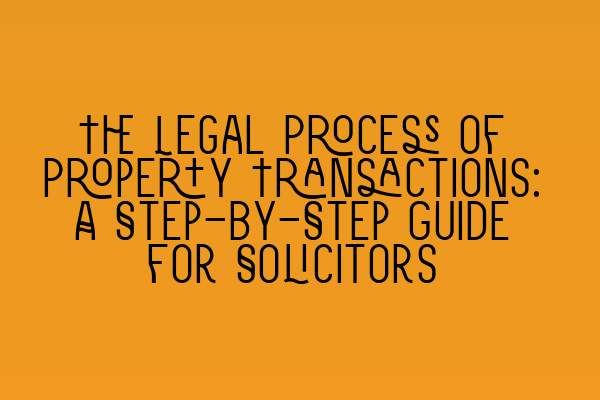The Legal Process of Property Transactions: A Step-by-Step Guide for Solicitors
As a solicitor specializing in property law, it is essential to have a thorough understanding of the legal process involved in property transactions. Whether you are assisting clients with buying, selling, or transferring property, following a step-by-step guide will not only ensure a smooth transaction but also help you provide the best possible service to your clients.
Step 1: Initial Consultation and Instructions
The first step in any property transaction is to meet with your client for an initial consultation. During this meeting, you will gather all the relevant details about the property and the intentions of your client. It is crucial to document these instructions accurately and clearly to avoid any misunderstandings.
Want to practice your knowledge of property law? Check out our SQE 1 Practice Exam Questions for some challenging scenarios.
Step 2: Conducting Property Searches
Once you have the instructions from your client, it is time to conduct property searches to gather relevant information. These searches include local authority searches, environmental searches, and property ownership searches. Thoroughly reviewing these search results will help identify any potential issues or restrictions that may impact the transaction.
Step 3: Drafting and Negotiating Contracts
After gathering all the necessary information, the next step is to draft the contract for the property transaction. It is vital to ensure the contract accurately reflects the intentions of both parties and protects your client’s interests. Negotiations may be required to reach mutually acceptable terms between the parties involved.
Looking for practice mocks for solicitors? Take a look at our SQE 1 Practice Mocks FLK1 FLK2 for realistic exam scenarios and challenges.
Step 4: Exchange of Contracts
Once both parties have agreed upon the contract terms, it is time to exchange contracts. This is a crucial step as it legally binds both parties to complete the transaction according to the agreed terms. At this stage, your client will typically pay a deposit, and a completion date will be set.
Step 5: Completion and Transfer of Ownership
On the agreed completion date, the property transaction is finalized, and ownership is transferred from the seller to the buyer. As the solicitor, you will ensure that all necessary payments are made, any outstanding issues are resolved, and the transfer of ownership documents are properly executed.
Preparing for your Solicitors Qualifying Examination (SQE)? Don’t forget to check out our comprehensive SQE 2 Preparation Courses and our specialized SQE 1 Preparation Courses to help you succeed in your exams.
Step 6: Registration and Post-Completion Matters
Following the completion of the property transaction, it is important to ensure that the change in ownership is registered with the relevant authorities, such as the Land Registry. Additionally, any post-completion matters, such as notifying utility providers of the change in ownership, should be taken care of to ensure a smooth transition for the new property owner.
Curious about the upcoming SRA SQE exam dates? Visit our website for the latest information on SRA SQE Exam Dates.
Step 7: Post-Transaction Follow-up
As a dedicated solicitor, it is important to provide post-transaction support to your clients. This may include answering any questions they may have, assisting with any further legal matters related to the property, or simply ensuring their satisfaction with the transaction and your services. Building strong client relationships will not only benefit your practice but also contribute to your professional reputation.
By following this comprehensive step-by-step guide, you can navigate the legal process of property transactions with confidence and provide exceptional service to your clients.
If you have any further questions about property law or the SQE exams, feel free to reach out to our team at SQE Property Law & Land Law. We are here to support you in your journey to becoming a successful solicitor.
